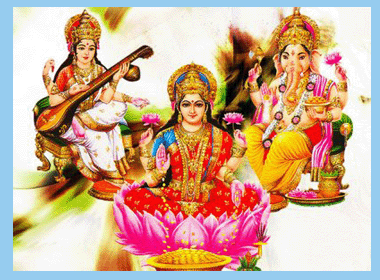Diwali Celebration
Through the celebration of Diwali spans over four days but in some parts of the country, as in the western India, the curtain for the period of the celebration is raised with Dhanteras or dhantrayodashi which falls on the thirteenth day of the month of Kartik.
The word "Dhan" means wealth. As such this day of the Diwali festival has a great importance for the rich mercantile community of Western India. Houses and business premises are renovated and decorated. Entrances are made colorful with lovely traditional motifs or Rangoli design to welcome the Goddess of wealth and prosperity. To indicate her long-awaited arrival, small footprints are drawn with rice flour and vermilion powder alll over the houses. Lamps are kept burning all through the nights. Believing this day to be auspicious woman purchase some gold or silver or at least one or two net utensils. "Lakhami-Puja" is performed in the evenings when tiny diyas of clay are lighted to drive away the shadows of evil sprits. "Bhajan" - devotional songs - in praise of Goddess Lakshmi are sung and "Naivedya" of traditional sweets is offered to the Goddess. There is a peculiar customin Maharastra to lightly pound dry coriandar seeds with jaggery and offer as Naivedya.
 In villlages cattle are adorned and worshiped by farmers as they form the main source of their income. In south cows are offered speical veneration as they are supported to be the incarnation of Goddess Lakshmi and therefore they are adorned and worshipped on this day.
In villlages cattle are adorned and worshiped by farmers as they form the main source of their income. In south cows are offered speical veneration as they are supported to be the incarnation of Goddess Lakshmi and therefore they are adorned and worshipped on this day.
The pre-diwali day is of great importance to the rich community of western India Houses and Business premises are renovated and decorated. Entrances are made colorful with lovely traditional motifs of Rangoli designs to welcome Lakshmi, the Goddess of wealth and prosperity. To indicate her long-awaited arrival, small footprints are drawn with rice flour and vermilion powder all over the houses. Lamps are kept burning all through the nights. Believing this day to be auspicious women purchase some gold or silver or at least one or two new utensils.
Lakshmi-Puja is performed in the evenings when tiny diyas of clay are lighted to drive away the shadows of evil spirits, devotional songs- in praise of Goddess Laxmi are sung and Naivedya of traditional sweets is offered to the Goddess.
Diwali or Deepavali
The day of Amavasya or the new moon which usually falls on the 15th day of the month of Kartik as per Indian lunar calendar sees the hub of the week long festive period. Goddess Lakshmi is worshipped as it is believed that on this day Goddess Lakshmi would be in her benevolant mood and would fulfill all the wishes of her devotees. One version says that it was on this day Goddess Lakshmi emerged from Kshira Sagara when the Gods and demons were churning the ocean world for raising of Amrita, the mythical elixir of life.
On this day there is a traditional practice specially in Maharashtra of taking bath before sunrise with oil and "Uptan" (paste) of gram flour and fragrant powders.
There is a peculiar custom in Maharashtra to lightly pound dry coriander seeds with jaggery and offer as Naivedya. In villages cattle's are adorned and worshipped by farmers as they form the main source of their income. In south cows are offered special veneration as they are supposed to be the incarnation of Goddess Lakshmi and therefore they are adorned and worshipped on this day.
In South India that victory of the divine over the mundane is celebrated in a very peculiar way. People wake up before sunrise prepare blood by mixing Kumkum in oil and after breaking a bitter fruit that represents the head of the demon King that was smashed by Krishna, apply that mixture on their foreheads. Then they have an oil bath using sandalwood paste.
Other Traditions
Apart from the epical attributions Diwali is regarded as a pious day for other reasons as well.
To the Jain's, Deepavali has an added significance to the great event of Mahaveera attaining the Eternal Bliss of Nirvaana.
It is on the same day of Amavasya Swami Dayananda Saraswati, that leonine sanyasin who was one of the first to light the torch of Hindu Renaissance during the last century, passed into Eternity.
Swami Ramatirtha who carried the fragrance of the spiritual message of Hindu Dharma to the western world Swami Ramatirtha who carried the fragrance of the spiritual message of Hindu Dharma to the western world, also passed into eternity. The lights kindled on this day also mark the attempt of their followers to immortalize the sacred memories of those great men who lived to brighten the lives of millions of their fellow beings. The passage of these great men have indeed brought the national-cum-spiritual tradition of Deepavali right up to modern times.